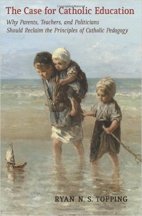Whither Catholic Education?

The Case for Catholic Education: Why Parents, Teachers, and Politicians Should Reclaim the Principles of Catholic Pedagogy. Ryan N. S. Topping. Kettering, OH: Angelico Press, 2015.
Ryan Topping is a fellow at the Thomas More College of Liberal Arts in Merrimack, NH. This slim book is a response to the sharp decline in Catholic primary and secondary education in North America. The U.S. statistics are grim: “Though the Catholic population has more than tripled since 1930, there are now fewer students in American Catholic schools than there were nearly one century ago. A mere 15 out of every 100 Catholic teens currently study in a Catholic school” (25). To make matters worse, when evaluated on a range of social and theological issues, the graduates of Catholic education are often hard to distinguish from the graduates of public schools. Parents who send their children to Catholic schools cannot be assured that their children will receive a proper Catholic formation. Topping’s book is a guide for Catholics seeking to restore to the education of Catholic children the traditional curriculum, methods, and goals.
Topping begins his book by criticizing the contemporary secular understanding of man and the secular education that accompanies that understanding. Public education aims to produce good citizens within the context of a liberal democratic polity. And it aims to provide us with the skills necessary for us to secure our material prosperity. But this utilitarian education has moved us closer to being Nietzschean last men. Catholics have a higher goal than comfortable self-preservation: salvation. By contrast with public schools, Catholic schools are supposed to help Catholics attain this higher goal. But Topping indicates that in our day, they don’t seem able to stand up to the secular culture in which they are immersed.
After these broad critiques, Topping presents the positive goals of a proper Catholic education: “happiness, culture, and virtue” (39). He then turns to the methods of education. He begins by attacking the educational idea, derived from Rousseau, that each child must be freed for the task of self-expression. This flawed view of education is based on Rousseau’s false notion of the natural goodness of man. Instead, Topping argues, each child must be presented with models of excellence to imitate. Topping then turns to the content of a proper Catholic education, and tells us that we must revive the seven liberal arts, i.e., the medieval trivium and quadrivium. He closes with a call for faith in the future and confidence in the renewal of Catholic education.
Topping’s book has some great strengths. It is solidly grounded in the Catholic Intellectual Tradition. At the same time, it is accessible to a non-scholarly audience. Serious Catholic parents seeking a better education for their children that what is typically on offer can learn from this book what they should be looking for. Educators seeking to reform Catholic schooling should find the book’s criticisms of modern education and arguments for traditional education very helpful.
Yet despite both the book’s strengths and Topping’s hope for a broad recovery of Catholic education, there is every prospect that most Catholic education will continue along its current path of drift and decline. Catholic education needs either a top-down or bottom-up renewal, but any effort at renewal is very likely to stall when it encounters the divisions among Catholic elites. If elite Catholic resistance to traditional Catholic education is to be overcome, Catholic traditionalists must fully confront the very powerful modern secular vision that has derailed so much of the Church. Early-modern philosophers offered a vision of relief from both material privation and the political distortions of glory seekers. That mission has largely been accomplished in the West, and yet the result is continued widespread unhappiness. Partly in response to this unhappiness, late-modern man has now turned his focus from reshaping his environment to reshaping himself, most visibly through identity politics and a quasi-totalitarian manipulation of language. That new mission will eventually end in failure. Indeed, all attempts at secular happiness will end in failure if they omit the one thing most needful for secular happiness: virtue.
Were Western elites open to this theoretical critique of modernity, we could avoid much coming anguish. But in fact, they are largely in thrall to a vision of secular redemption. All the same, perhaps they can be circumvented and even co-opted by a project of secular happiness properly understood. Were men educated in the classical pagan virtues, they might then experience worldly happiness. Were they simultaneously educated in the Christian virtues, they might then hope for the “everlasting happiness” that Topping and other Catholic traditionalists promote (39). Now, it will be objected that these two components are already in place in a traditional Catholic education because such an education incorporates the best of classical thought. But education in classical thought has too often been merely instructional and therefore inadequate. Let us, in this crisis, be frank: For as far back as the eye can see, far too many pious Catholics have lived unhappy lives on account of a lack of the classical pagan virtues. We can be dismayed but we should not be surprised that, in his desperate search for worldly happiness, modern man has looked to post-Christian sources. But this can change. If, in true Aristotelian fashion, Catholic education can be reformed so as to habituate and not merely instruct pupils in the classical pagan virtues, we might be permitted to hope that it can plant the seeds of a Second Renaissance.




